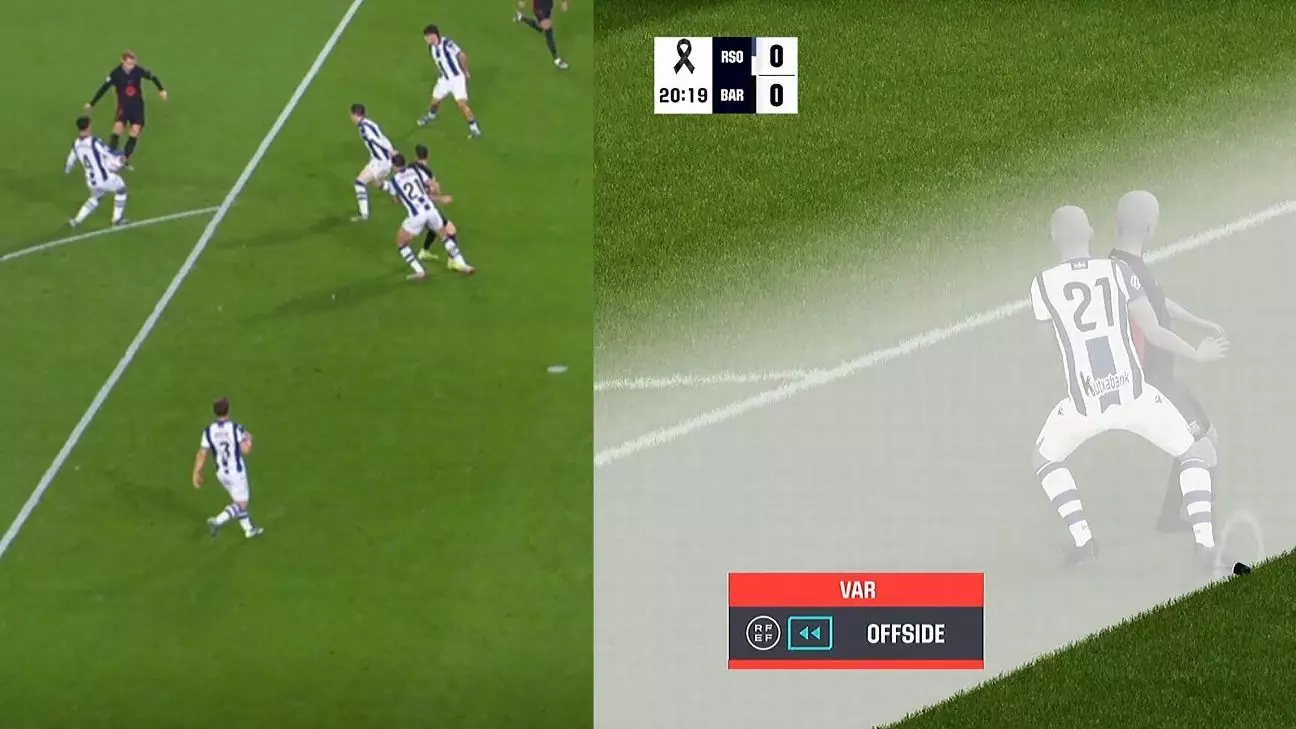In the recent La Liga match that saw Barcelona face off against Real Sociedad, a crucial moment emerged that has raised significant questions about the efficacy of VAR technology. Barcelona’s seasoned forward Robert Lewandowski had a perfectly constructed goal ruled out by the introduction of semi-automatic offside technology. This controversial decision led to a 1-0 defeat for the Catalan club, prompting an immediate call for clarity from general sporting director Deco. The disallowed goal was not just a critical moment in that game; it illustrates broader issues regarding VAR’s role in football and the transparency of officiating.
Deco conveyed his frustration during an interview with Mundo Deportivo, asserting that the need for a clear explanation about how VAR technology operates has never been more pressing. It seems that VAR, instead of evolving into a foolproof system, continues to raise more questions than it answers. The incident at Anoeta has once again put the spotlight on the challenges surrounding VAR, particularly the discrepancies between the intended purpose of the technology and its actual functionality on the pitch.
Hansi Flick, the head coach of Barcelona, made a compelling case, labeling the decision to disallow Lewandowski’s goal as “wrong” and a “huge mistake.” The core of the critique lies not merely in this singular incident but rather in the overarching implication of VAR’s capability to deliver consistent and fair judgments. Deco pointed out the lingering confusion surrounding the semi-automatic nature of the VAR system, elucidating that if this technology does not deliver unequivocal results, then perhaps a reassessment of the system is required. His analogy of driving a vehicle without knowing whether it runs on fuel or is electric resonates with the confusion fans and players alike have surrounding VAR.
Deco’s comments brought light to an essential element of VAR: human involvement. He expressed his bewilderment regarding the system’s semi-automatic designation, questioning whether it still relies on subjective interpretation from officials. If the technology is indeed semi-automated, then it raises the question: how much human intervention is required to justify calls made by the system? Such ambiguity has spurred outcry from teams across La Liga, as inconsistent officiating is a concern that transcends any single club.
The implementation of semi-automatic offside technology within La Liga, which monitors players’ positions using sophisticated cameras, aimed to modernize the officiating process by achieving greater accuracy. Yet, as evident in the case of Lewandowski, the technology’s reliability is still in question. Ironically, while Barcelona’s management has emphasized a need for transparency, the governing Refereeing Committee in Spain has staunchly defended the decision, asserting its correctness without delving deep into how that conclusion was reached.
This ongoing saga poses critical questions about the role of technology in sports today. Many pundits argue that the initial promise of VAR—to mitigate human error and provide objective rulings—has instead led to a new set of challenges. With various leagues like the English Premier League hesitating to adopt similar systems due to unresolved issues, the debate is far from settled. As clubs grapple with these erratic officiating methods, there is a growing consensus on the need for an overhaul of VAR practices to ensure fair play for all teams involved.
Beyond the contentious VAR issue, Barcelona’s plight against Real Sociedad also highlighted the absence of young talent Lamine Yamal. Having been a critical player in prior fixtures, Yamal’s sidelining during this match may have been a significant factor in the team’s performance. Deco pointed out the comparisons drawn between Yamal and Lionel Messi, admitting it is both a privilege and a potential burden for the emerging star.
While comparisons between players of different eras are natural in football, it’s essential to recognize Yamal’s unique position in this transitional phase for Barcelona. His presence in a squad navigating change speaks volumes about his potential, which may very well define Barcelona’s future trajectory. With the club in a reconstruction phase, the focus should be on nurturing talent rather than overshadowing it with unrealistic expectations.
As Barcelona grapples with the fallout from the controversial VAR decision and its implications for the club’s standing, it becomes increasingly vital for all stakeholders in football to work toward a common understanding of officiating technology. Deco’s insistence on the need for clarity presents an opportunity for improvement in how football clubs and fans engage with technology on the field.
The path forward must include transparent communication regarding VAR decisions, a thorough examination of how semi-automatic systems are integrated into matches, and a commitment to ensuring that fairness prevails on every pitch. If football is indeed at a crossroads, then it is essential to ensure that technology serves as an aid rather than a source of confusion moving forward.

